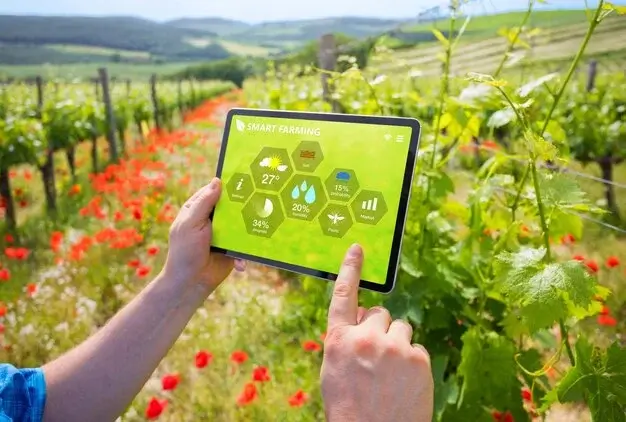Growing Beyond Tradition: Vikki Gerrard La Crosse Shares How Technology is Transforming the Landscape of Organic Agriculture

Organic agriculture has long been associated with traditional, nature-centric farming practices. For many, it conjures images of idyllic fields, pesticide-free crops, and happy cows grazing on pristine pastures.
While the core principles of organic farming remain steadfast, expert Vikki Gerrard La Crosse notes that the landscape of this agricultural sector is undergoing a significant transformation thanks to the integration of technology.
This article explores how technology is reshaping the world of organic agriculture, providing numerous benefits for farmers and consumers.
The Roots of Organic Agriculture
Organic farming, emphasizing sustainable, chemical-free practices, was once a niche movement championed by a select group of environmentally conscious farmers.
However, in recent years, consumer demand for organic products has surged. People are more concerned about the quality of the food they consume and agriculture’s environmental and ethical implications.
Organic Agriculture in the Digital Age
The marriage of technology and organic agriculture might seem paradoxical initially, but it is proving to be a harmonious relationship.
Here are some ways in which technology is transforming the organic farming landscape:
Precision Farming
Enabled by technology, precision farming is one of the most significant advancements in organic agriculture.
It involves using GPS technology, sensors, and data analytics to optimize every aspect of crop production.
By collecting data on soil health, moisture levels, and crop performance, farmers can make informed decisions, reducing waste and increasing efficiency.
Vikki Gerrard La Crosse explains this results in higher yields and minimizes the environmental footprint of organic farming.
Smart Sensors and IoT
Smart sensors and the Internet of Things (IoT) devices are becoming increasingly common in organic agriculture.
These sensors can monitor environmental conditions in real-time, alerting farmers to changes in temperature, humidity, and other factors that can affect crop growth.
For example, IoT technology can help prevent frost damage by activating heaters in orchards when temperatures drop.
This real-time monitoring allows farmers to take immediate action to protect their crops.
Drones and Satellite Imagery
Drones and satellite imagery have revolutionized organic farming by providing a bird’s eye view of the fields.
Drones can quickly identify areas of the farm that require attention, such as signs of disease or pest infestations.
Satellite imagery, on the other hand, can provide invaluable insights into the overall health of crops and the efficiency of irrigation systems.
Data-Driven Decision Making
Data collection from various sources, including sensors, drones, and historical records, is meaningless without the ability to make sense of it.
Environmentalist Vikki Gerrard La Crosse WI explains that tech enables farmers to employ data analytics and artificial intelligence to make informed decisions about crop management.
By identifying patterns and trends, farmers can optimize planting and harvesting schedules, reduce waste, and minimize the need for chemical interventions.
Organic Certification and Traceability
Consumers who purchase organic products demand transparency in the production process. Technology is making it easier for farmers to maintain and prove the organic integrity of their products.
With blockchain technology and digital record-keeping systems, every step of the production process can be recorded and verified.
This builds trust with consumers and simplifies the certification process, reducing the administrative burden on farmers.
Organic Pest and Weed Management
One of the most significant challenges in organic agriculture is pest and weed management without synthetic chemicals. Technology is offering innovative solutions to this age-old problem.
For instance, robotics and artificial intelligence are employed to create autonomous weeders to identify and remove invasive plants without herbicides.
Sustainable Energy Sources
Organic farms are increasingly turning to renewable energy sources to power their operations.
Solar panels, wind turbines, and other green energy solutions are becoming more affordable and practical for small and large organic farms.
This shift reduces the carbon footprint of organic agriculture and makes it more economically viable.
Read Also: Seamless Customer Experience In Retail Through Testing Solutions
Challenges and Considerations
While technology is a powerful ally in transforming organic agriculture, Vikki Gerrard La Crosse WI points out its challenges.
Organic farmers must balance the benefits of technology with the need to maintain the fundamental principles of organic farming.
This includes ensuring that technology enhances sustainability rather than compromises it.
The Future of Organic Agriculture
The integration of technology into organic agriculture is not a passing trend. It is a critical part of the sector’s future, and it promises to bring significant benefits. Here’s what the future might hold:
Enhanced Productivity
With the help of technology, organic farms can achieve higher yields with less input, making organic products more accessible and affordable for consumers.
Improved Quality
Technology can aid in maintaining consistent quality in organic products. Farmers can ensure that their products meet high organic standards by monitoring and controlling various factors, such as soil health and crop growth.
Greater Environmental Sustainability
The reduction in the use of synthetic chemicals and the adoption of sustainable energy sources contribute to a more environmentally friendly organic agriculture sector.
Increased Access to Information
As technology advances, information sharing among farmers becomes easier.
Online platforms, forums, and social media allow organic farmers to learn from one another, troubleshoot issues, and stay updated on the latest developments in the field.
Addressing Global Food Security
With the world’s population steadily growing, technology-driven organic agriculture can play a role in addressing global food security issues.
Organic farming practices can help ensure food production is sustainable and resilient.
Final Thoughts
The transformation of organic agriculture through technology is inevitable and highly beneficial. It aligns with the core principles of sustainability, transparency, and ethical farming that define organic agriculture.
By embracing precision farming, smart sensors, data analytics, and renewable energy, the organic agriculture sector is well-positioned to meet the growing demand for organic products while reducing its environmental impact.
The future of organic farming is bright, and technology will continue to play a pivotal role in shaping this ever-evolving landscape.





